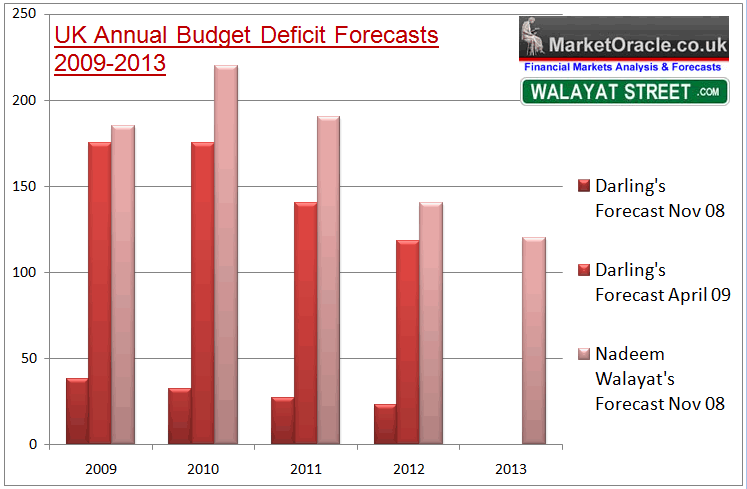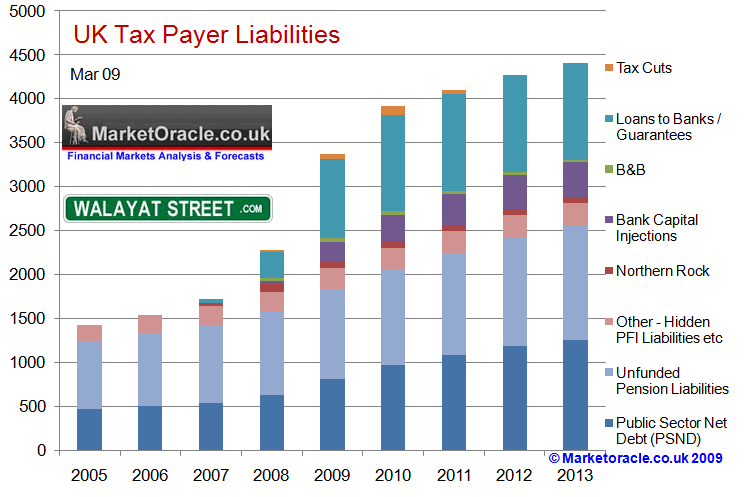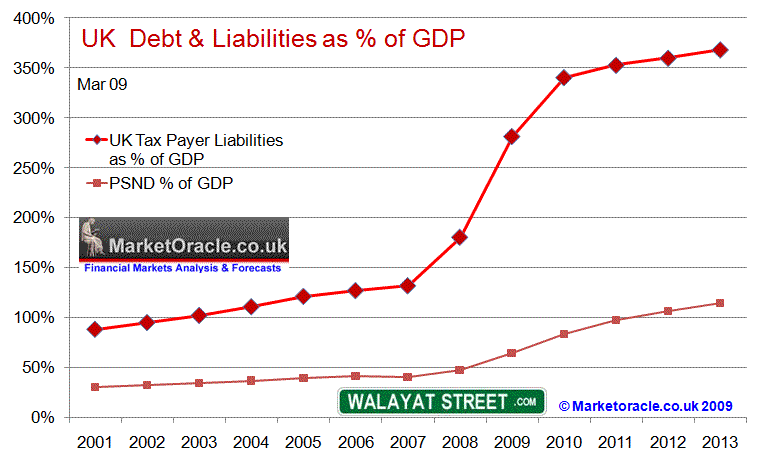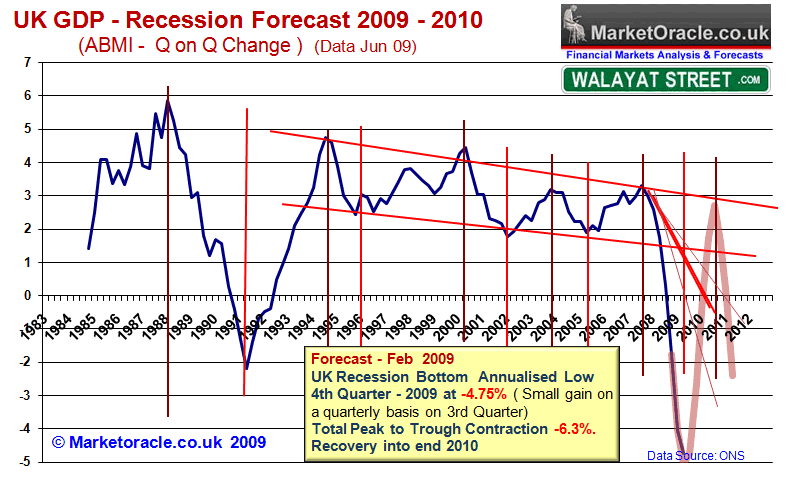BANKRUPT Banks Wiped Out by Tulip Backed Securities, Is China Cheap?
Stock-Markets / Credit Crisis 2008 Sep 09, 2008 - 09:16 AM GMTBy: Nadeem_Walayat

 The US governments takeover of the bankrupt Fannie Mae and Freddie Mac on Sunday is reminiscent of the UK governments nationalization of Northern Rock Bank, albeit the scale of Sundays takeover is of several orders of magnitude larger. Still the result is the same, total loss of capital for the shareholders. I won't repeat the dynamics of what has transpired on Sunday as the volume of similar articles speak for themselves.
The US governments takeover of the bankrupt Fannie Mae and Freddie Mac on Sunday is reminiscent of the UK governments nationalization of Northern Rock Bank, albeit the scale of Sundays takeover is of several orders of magnitude larger. Still the result is the same, total loss of capital for the shareholders. I won't repeat the dynamics of what has transpired on Sunday as the volume of similar articles speak for themselves.
 Those now contemplating buying 'cheap' banks should be aware that whilst many of the banks may survive, especially those that are too big to go bust such as the GSE's and Northern Rock in the UK, it does not mean that investors will not experience a near total loss of capital at the once thought of impossibility of big bank busts now increasingly becomes routine as the credit crisis moves into Phase II - The Economic Crunch.
Those now contemplating buying 'cheap' banks should be aware that whilst many of the banks may survive, especially those that are too big to go bust such as the GSE's and Northern Rock in the UK, it does not mean that investors will not experience a near total loss of capital at the once thought of impossibility of big bank busts now increasingly becomes routine as the credit crisis moves into Phase II - The Economic Crunch.
Whilst many banks will be able to hobble along though the aid of bailout money and capital injections by the clearly foolish and inexperienced sovereign wealth funds that know not what to do with all of the new found petrodollar and western consumer junk buying wealth. However this does imply that capital will be depleted which basically achieves the same outcome of loss of value of more than 90% for shareholders.
Most of the big banks are insolvent, much of the capital has already been destroyed, the only question that remains is how much of tax payers money will be spent on keeping the banks afloat. Despite all of the hype from the British government and some inexperienced market commentators, the British economy will be hit the hardest from the credit crisis due to the size of the financial sector and the lack of size of the manufacturing sector. Thus we witnessed sterling crash by more than 12% against the US Dollar, exceeding the forecast target of £/$1.80 by a good 4 cents, much commentary has immediately jumped on the bandwagon of how this will boost exporters, what exporters ? The UK's manufacturing base has shrunk to just 14% of the UK economy and of that exporters are barely a pin prick.
The only world beating industry Britain had was the financial sector which was inflated by the derivatives market that saw an artificial mark to market pricing boost bank profits, whilst few wondered how could the banks be making such huge profits when in actual fact the amount they earned from retail operations was barely 5% of the profits reported. The answer was the profits were NOT real, they comprised tulip mania methodology in the form of CDO's and mortgage backed junk, but that came to a halt suddenly one day in August 2007, when market participants stopped buying the tulip backed securities and thus the market collapsed, well it would have collapsed if there were an open market instead what resembled an inter bank money market price quote as compiled by the British Banking Association, whilst reporting a jump in the inter bank rates however this failed to report the true extent of the problem as the Banks fearing loss of credibility in a confidence obsessed market place, ms-reported the true extent of distress they were under and hence the crisis to some extent flew under the radar of the regulators, it was only in March of this year that the true extent of the problem started to dawn on the governments of the world that basically the big western banks were all virtually bankrupt due to their exposure to the fast deleveraging derivatives market.
Government action was taken, but as I pointed out at the time, the UK government throwing £50 billion at the financial system whilst a huge sum for the British tax payers, this was a mere drop in the the $500 trillion derivatives ocean, the true amount that the UK tax payer would end up financing will run in the several hundreds of billions of pounds. Total losses that the tulip backed banking crisis will generate keeps doubling, up from $100 billion way back in June 2007, to $200 billion, $400, $800, $1600 billion was the latest, well losses have now passed $600 billion and we are not passed the worse point yet. Another doubling of estimated losses coming up by year end to $3 trillion ?
What does all this mean ?
It means that the worlds western governments are fighting the twin battles of between inflation as a consequence of all of the money being printed for the politicians to save their electoral necks, and deflation from bursting of the credit bubble and global deleveraging.
As I warned way back in March of this year in the article DELEVERAGING- Gold and Commodities Teetering on the Brink of a Bear Market? , inflation will give way to deflation, as the economic crunch transpires as the last component required was to snuff out the commodities bull markets following the final peaks this summer,, the impact on inflation will lag somewhat so evidence of deflation may not emerge until early next year in the economic data. However it will and this will contribute to deep interest rate cuts, the UK interest rates could be cut all the way from 5% to as low as 3%. However as we have witnessed with the deep US interest rate cuts to 2%, the rate cuts will fail to stimulate the economies as it will not be enough to counter asset price deflation as a consequence of banks being forced to sell assets as deleveraging continues.
The trends remain inline with roadmap of March this year as the following graph illustrates:
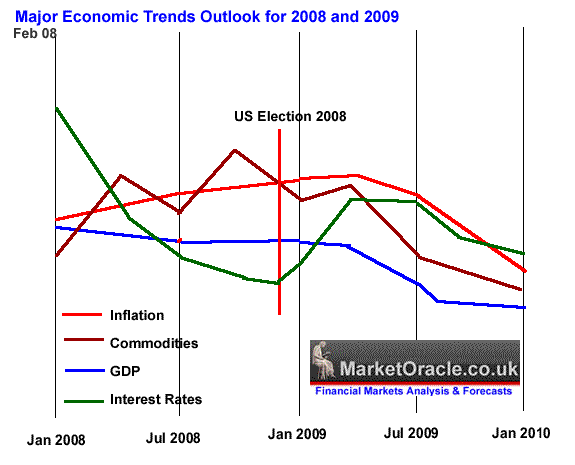
The light at the end of the tunnel will only come once the banks are able to repair their balance sheets hence much more tax payer bailout money.
What could investors do ?
Speaking for myself, I have focused on fixing cash savings inline with government 100% guarantee limits at fixed rates of return above 7% in sterling for maturity in 2 years time in advance of much lower interest rates, as well as diversifying into other currencies albeit at lower rates of interest. I am avoiding bonds as the consequence of the flood of government bailout debt implies higher bond yields.
The collapse in emerging markets has also perked my interest into accumulating limited holdings for the long-term primarily in China, and adding to existing investments in India. My original analysis way back in October / November 2007 targeted China's SSEC to fall by 40% to below 4000 as the graph illustrated.

Subsequent analysis in March this year concluded with a revised target of 3,000 to coincide with the strong support zone of between 2,500 to 3,000, the SSEC index has since fallen below that level to under 2,200, the SSEC is clearly homing in on the 2,000 support level and therefore the downside now looks increasingly limited on a long-term basis. Still these are volatile and uncertain times and the expectation therefore is for all investments to be for a period of well beyond the time frame of the current crisis so for well beyond 2011, but definitely the "You Must be Mad to buy in this market" conclusion of late last year no longer stands. The market is what I would now consider to be deeply oversold, though despite the strong growth prospects, chinese stocks could still get cheaper, which for this analyst is an acceptable risk for some long-term exposure which even after taking account of the fact that 2,500 to 3,000 levels will now act as strong overhead resistance.
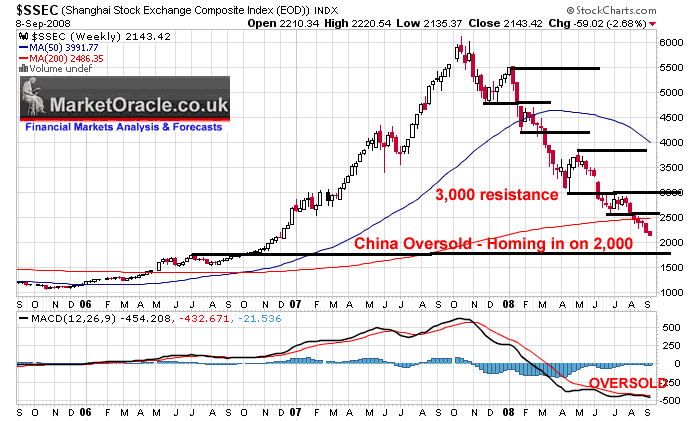
But where the bulk of portfolios are concerned cash still has to be king despite the impact of the collective currency devaluation as a result of exploding levels of government debt, that is expected to see UK debt bust through the 40% of GDP golden rule onwards and upwards towards 60% of GDP by late 2009. And as for the US taking over $5 trillion of Fannie and Freddie debit, whatever book keeping tricks are deployed, the fact of the matter is that $5 trillion is now effectively US Government Debt against which illiquid housing stock and derivatives are set against, therefore US debt has now doubled, the consequences of which will be experienced in the loss of the dollar's real value , now that does not mean that the US Dollar will fall, as the loss of value is relative to the other collapsing fiat currencies. My analysis of 17th August still stands for the US Dollar to be in a bull market that targets USD 90 by early 2009 (current USD 79).
Your trying hard to protect ones capital from asset price deflation and government debt inflation analyst.
By Nadeem Walayat
http://www.marketoracle.co.uk
Copyright © 2005-08 Marketoracle.co.uk (Market Oracle Ltd). All rights reserved.
Nadeem Walayat has over 20 years experience of trading, analysing and forecasting the financial markets, including one of few who both anticipated and Beat the 1987 Crash. Nadeem is the Editor of The Market Oracle, a FREE Daily Financial Markets Analysis & Forecasting online publication. We present in-depth analysis from over 150 experienced analysts on a range of views of the probable direction of the financial markets. Thus enabling our readers to arrive at an informed opinion on future market direction. http://www.marketoracle.co.uk
Disclaimer: The above is a matter of opinion provided for general information purposes only and is not intended as investment advice. Information and analysis above are derived from sources and utilising methods believed to be reliable, but we cannot accept responsibility for any trading losses you may incur as a result of this analysis. Individuals should consult with their personal financial advisors before engaging in any trading activities.
Nadeem Walayat Archive |
© 2005-2022 http://www.MarketOracle.co.uk - The Market Oracle is a FREE Daily Financial Markets Analysis & Forecasting online publication.
Comments
|
Kevin Stull
09 Sep 08, 20:19 |
HSBC - vulnerable?
Thank you for the excellent insights. How vulnerable is HSBC's stock price at this juncture? |
|
|
Patrick
10 Sep 08, 11:20 |
Re: BANKRUPT Banks Wiped Out by Tulip Backed
Nadeem, Wouldn't you agree the second sentence of this letter is a bit off the mark. We don't truly know the intracacies of what will happen, but based on all the research that has poured from this, the shareholders were not wiped out they were MASSIVELY diluted (80% or more). It can be argued this is a rounding error in some respect, but it can not be ignored for one reason. This lack of accountability proves to the world, we (THE US) will not play fair. Even Iceland forced shareholders to eat a total loss when recapitalizing the banks there last decade. Yet here where capitalism reigns supreme we have private gains and socialized losses. This is the worst of all worlds and it can not be treaded over lightly by misplaced words. I value your criticism and opinions as I receive them so I thank you for your work and only seek to add to your resources.
Good Day, Patrick |
|
|
Surinder
10 Sep 08, 11:20 |
Investing in India & China?
Hi Nadeem, I regularly visit Market Oracle & Financial Sense sites in order to keep in touch with macro-economic events. Also,currently reading "The Intelligent Investor" by Benjamin Graham. Recently finished reading and very much enjoyed Tony Plummer's book "Forecasting Financial Markets" By nature I am a conservative, contrarian, long-term thinker & investor. As an Indian living abroad, I would like to invest for the long-term in India & China using brokers & banks based in India. I would like to create an investment portfolio that is pretty much passive on a long-term hold which can be added to on corrections? Could you possibly provide any leads or recommendations for putting together such infrastructure? Any help would be greatly appreciated! Regards, Surinder |
|
|
Dave
10 Sep 08, 11:20 |
SSEC China Invest
The best way to buy the $SSEC on an American exchange via Schwab? Thanks! |
|
|
sunjay shah
12 Sep 08, 15:28 |
us market
Nadeem, Great commentary- very helpful. Why did the chinese market completely crash and the US has held up fairly well? The SSE is below fair value while the DJI has had only mild losses. The potential growth of China and seems higher than the US. Is the US about to enter a serious bear? |
|
|
Nadeem_Walayat
14 Sep 08, 18:59 |
Bankrupt Banks
Patrick, nope, I think you will find over the next 12 months that literally in many cases, shareholders will experience a total loss - 100%, in such a climate, an 80% loss will be deemed as a successful outcome, even those that survive the crisis will see their stakes diluted downwards as new capital replaces old capital and hence shareholders stakes shrink towards ZERO, okay perhaps not zero but LESS than 5% is most cases at the lows ! I.e. a 95% loss of value for the banks that survive, and many others that disappear a 100% loss ! |
|
|
Nadeem_Walayat
24 Sep 09, 21:39 |
Bankrupt Banks Update - September 09
Britain's debt as a consequence of bailing out the banking sector continues to mushroom towards unprecedented levels as the amount the UK government borrowed for August 09 came in at an eye watering £16.1 billion, already at 65.3 billion for the first 5 months of the financial and heading for £185 billion for 2009 as the original analysis of November 2008 warned of (Bankrupt Britain Trending Towards Hyper-Inflation?). UK Public Sector Net Debt is on track to achieve the projected £185 billion for the calendar year 2009 or an eye watering 14.6% of GDP with little sign of any government attempt at closing the gap between revenue and spending this side of the General Election and therefore is in line with my analysis of May 2009 of the Labour delivering the next Conservative Government a Scorched Earth Economy. Bankrupt Banks Sparked Depression Bankrupting British Tax Payers The tax payer bailed out bankrupt banks have been busy rebuilding their balance sheets by over charging retail customers penalty interest rates as the gap widens between rates charged for mortgages of 4.5%+ against the base rate of 0.5% and the interbank rate of just 0.57% which gives the banks a huge profit margin and is a sign of the near total collapse of market competition between the banks which are getting fat on tax payer cash and returning to paying out obscene bonuses which is the reason why the Labour Government deserves to be thrown out of government at the next election for total disregard for the electorate. Meanwhile the tax payer liabilities continue to grow as I have warned several times over the past 12 months in that total liabilities are growing from £1.75 trillion at the end of 2007 to more than £3.9 trillion by the end of 2010 as a consequence of the £1.5 to 2 trillion of liabilities of the bankrupt banking sector being ceremoniously dumped onto the tax payers in addition to the public sector deficit spending of £600 billion over 3 years in the lead up to the next election on which the country will have to pay interest which worsens the fiscal situation during each subsequent year hence the risk of an out of control debt spiral and inflation.
Way back in April 2008 when the Bank of England first gave tax payer cash to the banks, I warned that this could eventually lead to a loss of as much as £200 billion to the tax payer, a huge sum of money by any measure, however now collectively Britain could stand to lose as much as £500 billion to the banks, that can only be covered by printing even more money to monetize the debt and hence leads to inflation and probable investors balking at government debt issuances. Therefore we are looking at £600 billion of deficit spending PLUS £500 billion of bankrupt bank losses leading to a near tripling of Britians debt towards 120% of GDP, whilst total liabilities project to more than 350% of GDP.
UK Debt Fueled Economic Bounce UK GDP contraction has hit the target low of -4.75% on an annualised basis in the second quarter which suggests continuing recovery in Q3 and Q4 that signals that the UK economy remains on track to be out of recession by the start of 2010 with probability favouring Q3 being positive at +0.3% and Q4 in the region of of +.6 as per the analysis of June 2009 (UK Economy Set for Debt Fuelled Economic Recovery Into 2010 General Election) which is marginally ahead of the original forecast of February 2009, and compares against the OECD which appears to be way off the mark- Britain will be the only major economy not to return to growth by the end of the year, the Organisation for Economic Co-operation and Development (OECD) said yesterday as it downgraded its 2009 forecast for the UK He said the OECD was actually slightly less gloomy about the UK than it was in June, when it expected the UK economy to contract by about 0.4pc in the third quarter of this year. It now expects a smaller fall of 0.25pc. It was predicting a fall of about -0.1pc in the final quarter of the year, it now predicts flat growth. Whilst the OECD and other mainstream organisations / press have been busy in recent months revising their economic forecasts, my forecast remains the same as per Feb 09 and continues to project towards post general election tax hikes and deep public spending cuts that will in my opinion trigger a double dip RECESSION, even DEPRESSION 2011 to 2012 as illustrated by the graph.
To find out what I expect to transpire over the NEXT 10 years subscribe to my always free newsletter to receive this in your email box. By Nadeem Walayat http://www.marketoracle.co.uk Copyright © 2005-09 Marketoracle.co.uk (Market Oracle Ltd). All rights reserved. Nadeem Walayat has over 20 years experience of trading derivatives, portfolio management and analysing the financial markets, including one of few who both anticipated and Beat the 1987 Crash. Nadeem's forward looking analysis specialises on the housing market and interest rates. Nadeem is the Editor of The Market Oracle, a FREE Daily Financial Markets Analysis & Forecasting online publication. We present in-depth analysis from over 400 experienced analysts on a range of views of the probable direction of the financial markets. Thus enabling our readers to arrive at an informed opinion on future market direction. http://www.marketoracle.co.uk Disclaimer: The above is a matter of opinion provided for general information purposes only and is not intended as investment advice. Information and analysis above are derived from sources and utilising methods believed to be reliable, but we cannot accept responsibility for any trading losses you may incur as a result of this analysis. Individuals should consult with their personal financial advisors before engaging in any trading activities.
|
|
|
Mansoor H Khan
25 Sep 09, 05:02 |
A Radical Solution for America's Insolvent Financial System
Please see article: http://www.marketoracle.co.uk/Article13587.html |



